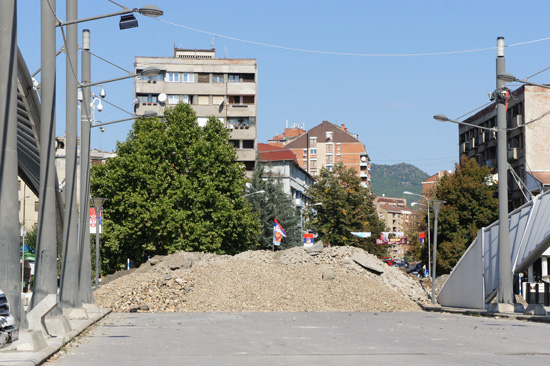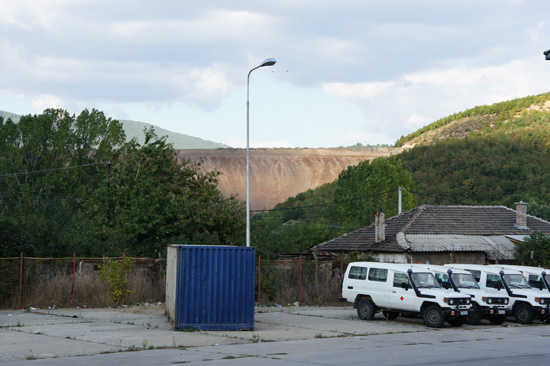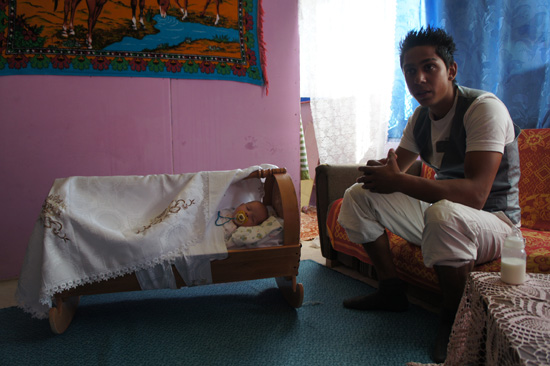Mitrovica, Kosovo
In the War between the Fronts
We spend a few days with the people in Camp Osterode, just as the war again becomes a real threat. The day before our arrival, the bridges in the city were blocked with mounds of dirt; the Serbian north Mitrovica is largely separated from the Albanian south. During our stay several attacks occur. At our camp one night, a loud explosion is heard: a car bomb was detonated nearby. The refugee camp Osterrode is located in the northern portion of the city. The Romas must frequently crossover the front lines as various family members are settled in the southwestern Mahala (quarter). Once again the Romas are at the mercy of history. As the events in 2004 in Vu?itrn showed, attacks on the minority population in Kosovo are unfortunately still a great danger. Romas are categorically harassed and stigmatized, suspected by both warring parties, bullied, beaten and chased.

The Roma Mahala, the traditional Roma-quarter, was inhabited by 8000 people before the war. In 1999, their houses were looted and destroyed. Many Romas from the Mahala fled abroad, some to Germany. Those who remained in Mitrovica were put up in provisional refugee-camps in the north of the city, an area that is heavily contaminated by a former lead mine; this was thought to be a temporary solution.
Forgotten in the poisoned Refugee Camp
The largest refugee camp is Osterode. The area previously served as a French NATO-barracks. Soldiers abandoned the site because the area is contaminated with lead. Thereafter the families were brought here with their children. The people have been stuck here for years, pioneering a disaster in itself. Since 2000, the World Health Organization (WHO) has registered dramatic poison levels. In 2004 the first child died; through 2008 a competent physician noted 77 victims, and in 2009 the number was said to be 80, but no one wanted to count correctly. Many of the victims have been children. The Romas have been exposed to the deadly poison in the ground, water, and air for years and the effects are especially detrimental to the children and unborn babies.

The people should have received houses in the Mahala long ago. In 2007 the first homes were finally completed. But as of autumn 2011, there are still fifteen families living in the refugee camp in northern Mitrovica. Behind the camp lies the site of the former mine; the area is barren, sparse, and highly toxic.
The settlement is fenced and guarded. On one hand, this serves as security for the Romas, but on the other, it strengthens a feelings of helplessness. A security guard patrols the grounds. Suddenly he begins loudly scolding the people in the camp, because another manhole cover has gone missing - it was presumably sold to a metal merchant for a few cents. The situation is very depressing for all. The Romas had to seek protection in the UN camps, but it was in the refugee camps themselves that they became ill and died. Here, in war-like conditions, exposed to the contamination from the lead mine, a structural violence is more than obvious, which is a sad reality for many Romas accross Europe.
(No)Life
Gejemi (pronounced: Jimmy) is our host in Mitrovica. He leads us through the Mahala and sets us up in Camp Osterode. Gjemi is young, agile, and full of hopes and plans. He speaks German, Romany, English, Albanian, Serbian and some French, and he writes songs and posts videos on Youtube. Sometimes he performs at parties or weddings, sings his own love songs and has already thought about trying out for 'German Idol', or the Albanian counterpart, although he still lacks the professional Equipment and the big breakthrough.
Despite his passion for pop, which he shares with many peers, Gjemis's life is different. His family fled to Germany during the war, as the Mahala here in Mitrovica was destroyed. The family lived in Germany until 2005. Then one morning they were awoken from their sleep and could only pack the most basic clothing before they were deported. Gjemi had just completed his schooling, and was to begin an apprenticeship as a car painter. Like his siblings, he was in the middle of training when he was uprooted from their social environment. A house, welfare and medical care for the ill parents was promised to the family, and educational integration to the children. But instead of being placed in a functioning society, they landed in a notorious refugee camp with highly toxic contamination. Gjemi still lives there today. He has been married for a year and now lives with his wife and four month old daughter in one of the large rooms in the barracks. He rocks his little daughter, who is tightly secured in a wooden cradle. It is livable here; painted walls, carpets, and curtains make the rooms cozy. We are drinking the Turkish coffee and nibbling on the cookies we brought with us. The insidious poison is invisible; another worry is much more pressing.

Not only do the war, the provocations and siege conditions threaten the lives of the Romas directly, but the working and living conditions are generally very severe. With an unemployment rate of 64% in Kosovo, it hits the stigmatized group of Romas disproportionately hard. Even the small, new homes cannot mask the social misery and lack of prospects. Hardly anyone has a paid job; the unemployment rate of the Romas is nearly one hundred percent. The Romas attempt to break through as day laborers - otherwise, their only option is to collect garbage. Autocratic employers, twelve-hour workdays six days per week for about five Euros a day without social protections such as retirement or health insurance are the norm here. A sense of self-worth and a hopeful glimpse into the future yields the paralyzing despair. In the first few months vital nutriments were handed out. For a while special attention was paid to ensure foods rich in specific trace elements were supplied in an effort to combat lead poisoning. But this direct assistance ended years ago, and to make matters worse, even medical aid is only available sporadically. The medical center in Osterode has been closed for years.
Flights to Pristina from Stuttgart, Basel, and Geneva run daily. A one-hour bus ride takes you to a mosque in the center of Mitrovica. Gjemi will pick you up here, if he invites you.
Visit the HOTEL GELEM in the camp Osterode in Mitrovica >>

